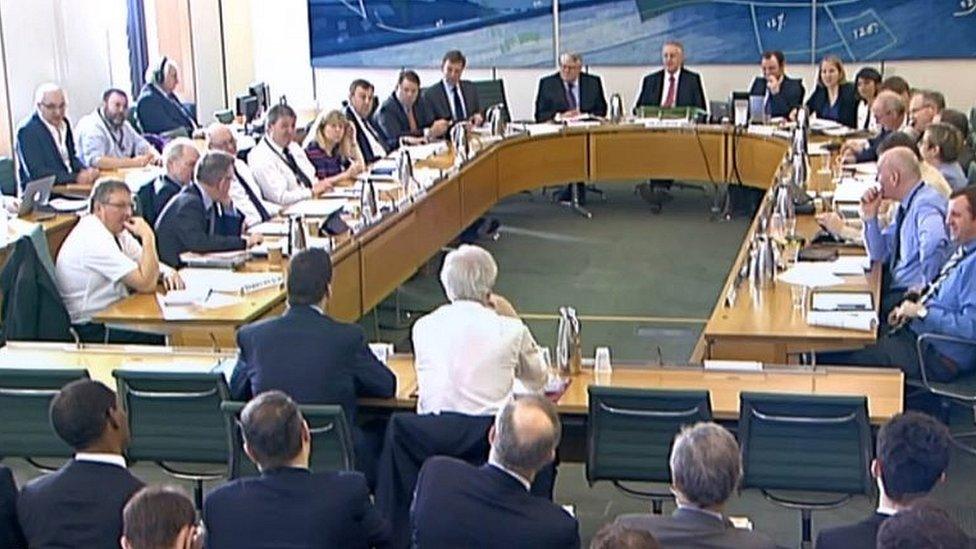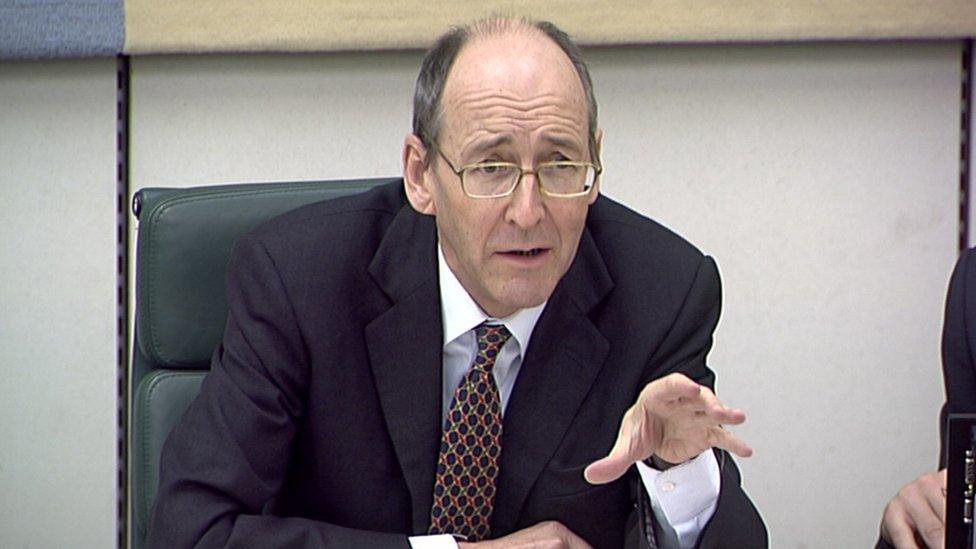Committee powerhouse takes time to get going
- Published
- comments

Eyes will be on the Brexit Committee in the next Parliament
The modern - elected - Commons committee system has become a political powerhouse, certainly in comparison to its tepid predecessors.
In the last Parliament, the Work and Pensions and Business Committees held spectacular hearings on the plight of the pensioners of the collapsed British Home Stores chain; the Foreign Affairs Committee had to be courted by David Cameron as he sought to ensure he got a Commons majority for military intervention in Syria; the Brexit Committee caused considerable ripples with its report on the status of EU nationals resident in the UK; the Health Committee pushed for a new tax on sugary drinks, and a pincer movement involving Health, Communities and the Public Accounts Committees highlighted the issue of NHS funding.
So how will the system fare in the new Parliament of 2017?
It will be a while before we find out.
With talk of a delay before Parliament can open for business, while the Conservatives and DUP negotiate a "confidence and supply" deal, it now looks distinctly possible that the whole Commons select committee system may not begin work until October.
Slow start
Getting the system going was always a ponderous process. The secret of the committees' recent success is that the chairs and the members have been elected since 2010 - giving them much more authority that they enjoyed in the days when they were appointed by the party whips.
But the two stage process of electing the chairs, and then the ordinary members could stretch into the Commons two week September sitting, before the conference break…which could mean the first actual hearings might be in October.
And because no government enjoys detailed scrutiny (imagine the select committees starting to take an interest in how much extra funding might be funnelled into Northern Ireland as the price of the DUP's support for the Conservative government), there's little incentive to speed the process up.
There's probably little that can be done to hasten the process at the moment, but influential voices are beginning to murmur about changing the rules to ensure that the next government can't consign the process of setting up committee scrutiny to slow-motion, again.
So how does the system work?
First, the parties will have to agree a new share out of the committee chairs; the change in the composition of the Commons might mean some slight redistribution, perhaps with Labour gaining an extra chair.
Some committees - Public Accounts and Backbench Business - automatically have an opposition MP in the chair, but the balance is not just a matter of numbers, because some committees carry greater weight than others.
In the last Parliament, Labour had the chairs of Home Affairs, Brexit and Business and Industrial Strategy; they will want to keep all of those.
Electing the chairs
Once a new share-out is agreed, the next step is for all MPs to elect the chairs of the committees.
Tentatively, Commons officials were eying 5 July as election day for the committee chairs.
But that was before the prospect of a later Queen's Speech. Each week of delay pushed back this timetable. And for some incumbents, there is another hurdle; the term limits imposed in standing orders, which limit chairs to serving for two parliaments or eight years, whichever is the longer.
This could catch a number of the current titans of the committee corridor - Louise Ellman on the Transport Committee, David TC Davies (Welsh Affairs), Laurence Robertson (Northern Ireland), and Sir Bill Cash (European Scrutiny).
If elected, they could only stay in office for a little under a year, before the eight year limit was reached - unless MPs were invited to vote on changing the rules to give them an extra lease of life.

Andrew Tyrie was a formidable interrogator of witnesses appearing before the committee
Another who would have been caught by the limit would have been the Treasury Committee Chair, Andrew Tyrie, and that was probably a major factor in his decision to stand down from the Commons. He never made the government's life easy, so his departure might make extending the terms of those who remain easier for ministers to stomach.
In the case of another long-serving incumbent, Bernard Jenkin (Public Administration and Constitutional Affairs) there's another issue - at the start of the 2015 Parliament his Public Administration Committee had its remit expanded to cover constitutional issues - so he may be in a position to argue that the ban does not apply because his original committee has morphed into something else.
In any event, there will be some important roles up for grabs.
Key scrutiny
The chair of the Treasury Committee is always a major player in the world of Westminster, and the defeat of the Conservative chair of the Education Committee, Neil Carmichael, opens up another plum job - but all of the committees can carry considerable clout under the leadership of a chair who knows what they are doing.
Some of the previous parliament's incumbents might be called to higher things; Yvette Cooper (Home Affairs) and Hilary Benn (Brexit) might, perhaps, be asked to rejoin Jeremy Corbyn's shadow cabinet.
But both Home Affairs and Brexit are hugely influential posts - and in a hung Parliament, where the terms of the UK's departure from the EU is the over-riding issue, the chair of the Brexit Committee, in particular, in could be fantastically important. But, in general, for a minority government the support or opposition of a select committee could tip the balance in a tight Commons vote.

Barry Gardiner campaigned for chair of the Environment Audit Committee
It is not a done deal that the incumbent chairs will be re-elected.
Justice Committee Chair Bob Neill, for example, has been one of the most active pro-Remain rebels on the Tory benches, and might face retribution. The Health Committee chair, Sarah Wollaston has proved to be independent minded, on everything from a sugary drinks tax to the impact of Brexit on the NHS workforce….so it is possible she could attract a challenger.
There is now open electioneering for these posts (I still have Barry Gardiner's election literature from his run for the chair of the Environmental Audit Committee in the last Parliament) and a particular hazard is candidates lurking at the top of the escalator in Portcullis House - the big parliamentary office building - seeking to make eye contact with possible voters as they come into view.
The elections for chairs are then followed by elections within the different party groups for membership of select committees - so, for example, the Conservative 1922 Committee makes arrangements to elect the Conservative members of the committees according to its own rules and timetable; similarly the Parliamentary Labour Party, the SNP and Lib Dems will generate their quota of committee members according to their particular custom and practice.
The committees then have to meet and agree a work programme - and a few really ambitious chairs might try to get an actual hearing scheduled in advance, with the obvious play being a "getting to know you" session with their particular departmental Secretary of State.
They could even make the first moves on that before their committee had been fully elected - because for most committees it would be an obvious and completely uncontroversial thing to do.